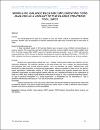Work-Life -Balance in Qatar: Implementing Tows Analysis as a Variant of the Classic Strategic Tool, SWOT
| Author | El-Kassem, Rima Charbaji |
| Available date | 2018-09-06T08:35:39Z |
| Publication Date | 2018-08 |
| Publication Name | Journal of WEI Business and Economics (JWEIBE) |
| Citation | El-Kassem, Rima Charbaji. Work-Life -Balance in Qatar: Implementing Tows Analysis as a Variant of the Classic Strategic Tool, SWOT. Journal of WEI Business and Economics (JWEIBE). 7(2) , P.p. 31 -48 |
| ISSN | 2166-8477 |
| Abstract | Purpose The overall goal of this paper is to explore via Gap and TOWS analysis if organizations are offering innovative benefits from the perspective of married employees that make being a working dad or mom easier in Qatar. Design/methodology/approach A large convenient sample of 824 working Qataris were surveyed, using a 15-item instrument based on previous research. The researchers used factor analysis to ascertain construct validity, based on two suitability tests: First, the Kaisers-Meyer-Olkin (KMO) measure of sampling adequacy generated a score of 0.807, well above the recommended level of 0.50. Second, the Bartless test of sphericity result was significant (Chi Square = 2079.671, P= 0.00), indicating that there are adequate inter-correlations between the items which allow the use of factor analysis. Findings Findings of the gap analysis validate the trust – building model between leaders and followers from the employee’s perspective. The responses identified in this study enhance the trust in leaders who behave ethically, treat employees fairly, and promote work-life balance. This is an indication that Qatar’s National Vision 2030 introduced by Qatar government is transforming organizations’ values and attitudes in Qatar so that they perform beyond expectations. Additionally, findings of TWOS analysis identified four employer benefits items that are considered opportunities and eight employer benefits items that are identified as threats for the organizations in Qatar as a whole. Also, findings of path analysis confirm that the impact of “gap in perceived supervisor support” on “gap in perceived development of a caring organization” is strengthened via the intervening of “gap in perceived child-friendly working hours” and “gap in perceived parental leave”. Originality Qatar’s National Vision 2030 has set new future trends that demand changes in organizational culture and the empirical findings of this article should help decision and policy makers in Qatar to determine where change is possible and to focus on priorities as well as possibilities. |
| Language | en |
| Publisher | West East Institute Journals |
| Subject | Employee benefits Factor analysis SWOT analysis TWOS analysis Gap analysis Factor analysis Path analysis |
| Type | Article |
| Pagination | 31 - 48 |
| Issue Number | 2 |
| Volume Number | 7 |
| ESSN | 2166-7918 |
Files in this item
This item appears in the following Collection(s)
-
Social & Economic Survey Research Institute Research [297 items ]




